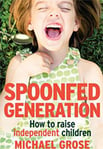
Even the best parents make mistakes. Generally it's better to focus on the positives - what you should be doing as a parent - than fixate on where you are messing up. However, sometimes it helps to be reminded of some of the behaviours we should stop or do less of, if we are to raise autonomous, emotionally-smart citizens of the future.
Michael Grose, parenting educator and founder of Parenting Ideas, outlines some of the biggest offenders below:
Doing too much
Kids need to learn to fend for themselves and stand on their own two feet. Independence is the aim for parents. Learn to delegate.
Winning arguments
The need to win arguments and prove that you are right harms relationships and creates fertile ground for conflict. Focus on the things that matter.
Expecting too little
Expectations are tricky. Too high and kids can give up. Too low and kids will meet them. Pitch them at their own abilities and their developmental age.
Speaking when angry
Speaking tends to be a default mechanism regardless of your emotional state. When you’re angry kids don’t listen. They pick up your venom but not your words. Choose the time and the place to speak to kids.
Failing to give proper recognition
It’s easy to take children’s good behaviour and their contributions to the family for granted. The behaviours you focus on expand so catch kids doing the right thing.
Playing favourites
Children usually know who’s the favoured or preferred child in their family. Your discipline and expectations give this away. Share the parenting with others so you share the favouritism.
Letting kids drop out of the family
In small families most children have their own bedroom, which means isolation is easy to achieve. Teenagers, in particular, tend to prefer their own company rather than the company of peers and parents. Put rituals in place and make sure everyone turns up to meal-time.
Taking the easy way out
It’s a quirk of modern life that as parents get busier with work and other things there is a tremendous temptation to avoid arguments by giving into kids. Hang in there when you know it’s the right thing to do.
Judging yourself too harshly
Parents are generally hard markers of themselves. Kids are more forgiving of their parents’ blunders than their parents. Parent your family as if it’s a large one.
Solving too many problems
It’s tempting to try to solve our children’s problems rather than leave some for them to solve. A forgotten school lunch is a child’s problem not a parent’s problem. Pose problems for kids rather than solve them.
Confusing helping for responsibility
We all love it when our children help at home, but this shouldn’t be confused with taking responsibility. A child who gets himself up in the morning is learning to take responsibility. If you want a child to be responsible give him real responsibility.
Telling kids everything will be OK when they are anxious
It’s human nature to reassure your children when they are worried or anxious that everything will be OK. This however is not always true and reassurance leads to dependence. Validate your child’s worries so that they feel understood. Kids need to hear “I get it” rather than “Get over it”.
Taking yourself too seriously
There is a lot of gravitas placed on parents’ behaviours and on modelling that can weigh you down and take the joy from being a parent. Take time to enjoy the little things in family life.
Parenting the individual
Small family parenting is almost always an individual endeavour. It’s worth remembering that sibling relationships (if children have siblings) can be just as influential as the parent-child relationship. It will almost certainly outlast the parent-child relationship. Lead the group, manage the child.
Refusal to express regret
Sometimes parents can work themselves into a tight corner after they’ve said something out of anger or desperation. One parent I know cancelled Christmas out of desperation and refused to admit she was wrong. Sometimes you need to acknowledge your mistakes and start over again.
Failing to use communication processes
Establish communication processes and communication places well in advance of when you really need them. For example if you are about to talk to your children about sexuality and relationships, what process do you use? Where will you hold that conversation?
Neglecting your own wellbeing
Many families operate under a child-first mentality, which places a lot of pressure and stress on parents. We happily drive kids to their leisure activities at the expense of our own. Carve out some time for your own interests and leisure pursuits.
Giving feedback at the wrong time
Timing is everything when you give kids feedback. If you give negative feedback immediately after an event or action, you risk discouraging them. Use ‘just in time prompts’ to remind them how to do something. Pick your timing when you give feedback.
Clinging to the past
The ghosts from the past are strong indeed causing us to put some of our problems onto our children. The problems we may have experienced growing up won’t necessarily be shared by our children. Re-tune your parenting antennae to your child’s life and away from yours.
Believing everything your children say
As loving parents we want to trust our children and believe everything they tell us. Children are faulty observers and frequently only see one side of an issue. Help children process what happens to them and see issues from every side.
After reviewing this list, for those of you who still aren’t sure what to stop, there is one bad habit that takes precedence over all of the others. According to Michael Grose, the number one parenting problem is doing too much for your kids.
This blog was reproduced with kind permission from Parenting Ideas.
Further Reading:

"Spoonfed Generation - How to Raise Independent Children" - Michael Grose










